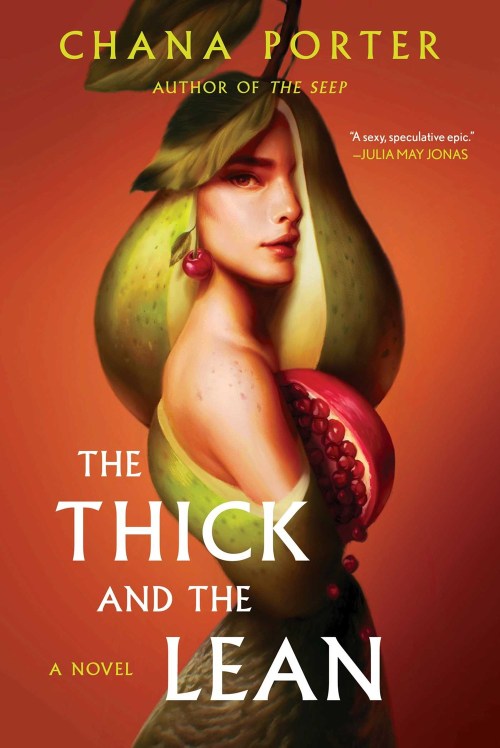[ad_1]
Chana Porter, author of the acclaimed speculative novel The Seep, has returned in full force to her imaginative worldbuilding and incisive cultural commentary that made that book so successful. In The Thick and the Lean, she explores a religious society where delicious food is taboo, and the act of eating is as inelegant and as hidden from the world as using the bathroom. The culture she crafts is driven by religious fervor, and she explores the nature of this through two point of view characters Beatrice, a young woman brought up in the Seagate cult, is raised to eat as little as possible but secretly harbors a love for cooking. Reiko, born into the marginalized indigenous population of the country, must craft a new life for herself once her scholarship to university is snatched away. Their stories are set into motion by the oppressive nature of their society, with the intersections of religion, class, and physical appearance playing varying roles in their marginalization. Both Beatrice and Reiko are guided by a mysterious book, part cookbook, part memoir, with significance to the culture at large that neither of them envision.
Where Porter excels is in her examination of food culture, sensuality, and body image. When Beatrice enters the world of food, she gives up her formerly slim figure and must come to terms with varying standards of beauty, both societal and self-imposed. Elements of sexual attraction pervade the narrative, although, similar to older speculative works like Brave New World, sexuality is seen as a distraction from the embedded secrets of society. Intimate scenes are loving yet removed, passionate yet nonsensical, depending on context and character. At times this can be off-putting to read, especially when rendered in the language and cultural norms of this dystopian society, but otherwise these bodily experiences transcend Porter’s second world and provide increasing relevance to our own.
But Porter’s narrative expands beyond the body. Reiko’s story is primarily focused on marginalization and class divides, what it means to climb the social ladder, but her integration with Beatrice’s tale takes the majority of the novel to discover, and once realized, the narrative is unevenly paced and speeds along towards its end. For all the time we spend exploring Beatrice’s worldview and engaged in lush food writing, we get comparatively less of Reiko, and one wonders how the novel would read if it honed in on the food concept without distraction, or integrated Reiko’s plot arc from the beginning.
Similarly, while Porter’s writing is tantalizing as she describes elements of the body, food, and sex, the characters themselves are kept at a distance. Dialogue between them captures the cultish tendencies and language of oppressive regimes, and we are introduced to a variety of sexual identities and preferences, but the characters rarely attain other characteristics; they are solely defined by these one-note ideas. Beatrice’s conflicts with her family and religious leaders resolve neatly, and her interactions with other characters feel tensionless for much of the novel.
There is a tremendous sense of intrigue as we make our way through Porter’s oppressive world, but interpersonal problems appear and disappear at will, neatly shrugged aside to make room for broader societal narrative. Indeed, where we feel the most emotion are in the portions of interwoven folklore, which add up to a small fraction of the overall story. Hate crimes, parental estrangements, betrayal, and deceit are glossed over, when a tighter narrative or simply more time would allow more space for these events to be fully realized on an emotional and structural level. The ultimate climax of the novel, which is built mostly on Reiko’s chapters, suffers from an abrupt tonal shift and character decision-making that appears, to the reader, out of the blue. To put it simply, Porter’s novel shines in broad strokes, but smaller character details are somewhat lost. We are touring through a stunning, strange world, yet kept at a distance from its people.
Nevertheless, The Thick and the Lean delivers on premise and promise alike. Food kept aside as an ultimate taboo feels foreign in our world, but the way Chana Porter interweaves this with all-too-familiar societal fatphobia and examinations of oppressive cultural structures, these elements lean the premise into the real and surreal simultaneously, and this on its own is a feat worth commending.

FICTION
The Thick and the Lean
Chana Porter
Gallery / Saga Press
Published April 18th, 2023
[ad_2]
Source link

